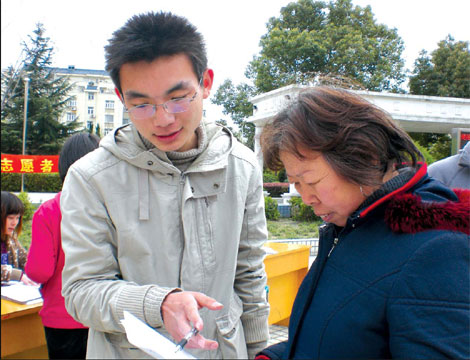Society
Mind your Shanghainese, please
Updated: 2010-12-31 11:07
By Qian Yanfeng (China Daily European Weekly)
Every Wednesday night, a group of 40 to 50 students gather inside a classroom at Shanghai University of Engineering Science for a two-hour lesson.
But don't mistake it for an English corner - it is a Shanghai dialect corner.
Among the avid language learners are not only out-of-towners, who want to make their lives in the city easier, but also locals, who have lost proficiency in their native tongue after years of using Putonghua, or Mandarin.
The language shift is a major change from more than two decades ago, when Shanghainese was widely spoken across the city, and many Chinese who travel or move to the city complained about Shanghai arrogance, which was voiced through the local dialect.
But the situation has changed.
"According to our latest survey, 28 percent of the local students said they speak the dialect poorly and therefore would rather not use it. Putonghua has become their language of choice," said Li Jun, organizer of the Shanghai dialect corner, which now has a membership of more than 100.
A survey by Shanghai Language and Words Committee earlier this year polled more than 8,600 local students from kindergartens to universities and the findings showed only 38 percent felt "intimate" speaking or hearing Shanghainese.
About 50 percent said they did not have any feeling toward the dialect, and another 9 percent complained they felt uncomfortable with it.
Meanwhile, 40 percent of Shanghainese families said they talked to their children in both Putonghua and the local dialect, while 45 percent said they used Shanghainese as the primary language at home.
|
|
According to the survey, students tended to use the local dialect more as they grew older.
Despite its former status as the de facto lingua franca in the Yangtze River Delta, the influence of the Shanghai dialect has been waning in recent years together with the rise of the city's status as a cosmopolitan global city, which encourages the use of Mandarin as the standard language to conduct business and services.
Like many other Chinese cities, Shanghai also discourages on speaking the local dialect at primary and secondary schools to promote Mandarin use.
As a result, there have been fears from linguists and historians over the younger generation's failure to carry on the history and tradition of the dialect.
Similar fears also exist in other cities. In Guangzhou, about 1,000 people took to the streets in July this year to protest against a proposal to switch the language used in many local TV shows from Cantonese to Mandarin.
Local authorities explained the move was aimed at making the city more visitor-friendly.
In Shanghai, where the switch to Mandarin has been smoother, the dialect spoken by today's young people is already quite different from that spoken by the older population, experts said.
Mixing Mandarin and Shanghainese in everyday conversation is now common among young people.
Wang Aiqin, a 37-year-old Shanghai mother, said her 12-year-old daughter has difficulty expressing ideas in her native tongue and inserts Mandarin into broken Shanghainese sentences.
"She is used to using Mandarin with her teachers and classmates and finds it difficult to switch," Wang said.
"In the end, it is we as her parents who should accommodate her and speak Putonghua as well. I know many parents also do so," she added.
Qian Nairong, a professor at the Chinese language department at Shanghai University, said the loss of a local dialect's popularity with a younger generation means a loss of culture.
"It also means that many age-old meanings and expressions, which are part of the city's history and culture are lost," he said.
"While we encourage the use of Mandarin for more efficient communication, we should also realize that it should not come at a price of the extinction of local dialects."
Qian said students learnt the dialect as they matured but it was different from picking it up naturally as their native tongue.
"When they learn it as a second language, it's difficult for them to fully grasp its different shades of meaning and their first choice of language will still be Mandarin," he said.
"We should therefore call on more parents to recognize the need for a local language environment at home.
"We also hope there would be more people like stand-up comedian Zhou Libo, who has promoted the popularity of Shanghainese with his entertaining jokes in the local dialect."
E-paper

Ear We Go
China and the world set to embrace the merciful, peaceful year of rabbit
Preview of the coming issue
Carrefour finds the going tough in China
Maid to Order
Specials

Mysteries written in blood
Historical records and Caucasian features of locals suggest link with Roman Empire.

Winning Charm
Coastal Yantai banks on little things that matter to grow

New rules to hit property market
The State Council launched a new round of measures to rein in property prices.

